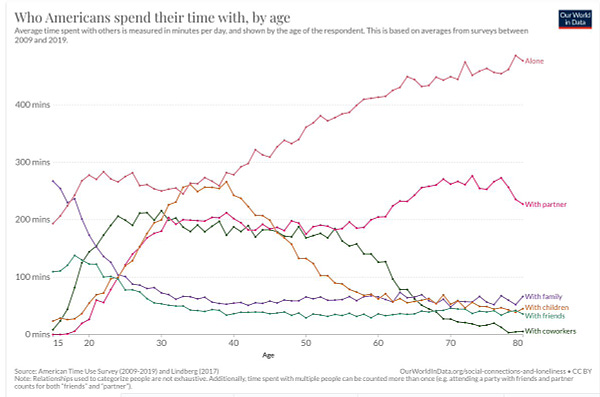I’ve been writing “forward” in chronological time.
Part One - getting started with Core Capital
Part Two - getting paid in time, freeing one’s self from 9-5 and Human Capital
Part Three - household expansion & contraction as well as Being Local.
Have you heard of the expression Peak Earning Years?
For college educated workers, it runs from the mid-40s to mid-50s.
This piece isn’t about earning. It’s about helping you consider a future that is likely to be very different from the life you lead in your Peak Earning Years.
Regardless of earnings, early middle age is often characterized by more opportunities, and obligations, than we know what to do with:
Family, aging parents and active kids
Work
Friends, we don’t see enough of
For most of us, the future will be very different.


Financial Planners talk of longevity risk, which is the risk of outliving retirement funds.
Doctors talk about lifestyle risk factors.
However, the risk for EVERYONE is ending up alone and not engaged. This goes directly to the quality of our life experience. For many of us, it starts to happen before our kids move out.
Rather than building the balance sheet, I’ve been working on my Elderhood Project since my mid-40s.
I want to walk you through several themes:
Capacity
Mastery & Engagement
Community
Capital Allocation
Someone in your family’s “Peak Earnings” generation needs to be thinking about this. This person needs to drive:
Conversations
Education1
By “drive conversations” I mean host the discussion. Let the current Elders do most the talking. They are the ones who know this issue best.
Capacity
My Endurance Essentials Substack is devoted to endurance training. It’s well past what you need for health and longevity.
Howard’s book is a better place to start.

Endurance athletes have two important advantages when it comes to healthy aging.
Capacity
Metabolic Health2
From our mid-40s onwards, we lose capacity.
The impact of this loss depends on several factors:
Our Reserve - our starting capacity
The Rate of Loss - what we do across middle age
If we spend our peak earning years focused on the balance sheet, then we are trading away capacity in elderhood.
Capacity, combined with metabolic health, are important factors in maintaining independence.
Mastery & Engagement
A favorite topic of mine.3
I have always spent a lot of time alone.
20s: working alone on investment projects
30s: training alone for triathlon
40s: an alone-deficit (!) due to my young family
50s: a mix of writing, reading and training
The periods of my life where “alone” started to have a negative impact on my mood, thinking and mental health… had a deficit of Mastery & Engagement.
Golf
Ironman Training
Expeditions
Travel
Surfing
There are many ways to seek Mastery & Engagement.
The question I asked myself:
What are the sorts of things I could be good at, after 60?
It need not be a physical pursuit. One of my favorite games to play is writing.
Pick One - get it done.
Community
Who’s your tribe?
What do they like to do when they aren’t working?
One of the neat things about being an endurance coach is my tribe is people who like doing the same thing as me.
…and they do it when they aren’t working.
…and it’s a favorite part of their lives.
That was a great mix for making deep friendships.
Thing is, I see my pals once a year, if I’m lucky.
I needed to broaden my local reach.
Volunteering4
Clubs
The volunteering project that’s stuck is helping our local school board. I have no background in education. Turns out, that makes me useful. I approach things differently than the more experienced committee members.
What do active seniors do in your hometown?
In Boulder…
Skiing
Triathlon
Tennis / Pickleball
At 45, I was an awful skier, not anymore. Learning to ski was a family project we enjoyed together. Skiing was my early 50s mastery project.
Here’s what we did:
Take a look around
See what healthy elders are doing LOCALLY
Join communities BEFORE we needed them
Some of the communities had long waitlists. Not a problem. We saw the need over a decade before we wanted to join.
Where do the healthiest people over 60 hang out?
That was the filter I used to join three clubs.
Membership in the clubs gives me:
Less friction to exercise.
A nudge in the direction I want to take myself.
A community I can access at any time.
Events I don’t need to organize.
A place to go, and get myself away from my screens (!).
Capital Allocation
I’ll start with the punchline:
Allocate the minimum capital to solve the issue.
and
The older I get, the less I will want to travel.
Everything above involves the minimum outlay to create options for the future.
We don’t own a second home.
We don’t need to get on a plane.
We didn’t join a country club, or its equivalent.
What we did was create local options and start the process of deepening our ties within our community.
By limiting our capital outlay, we maintain flexibility for an uncertain future.
At some point, the future will arrive.
That’s going to be the topic for Part Five.
A family meeting is an effective venue for these discussions. Start by defining What Is Living Well.
We’re going to be hearing a lot more about the role of metabolic health. Here’s my best advice on Lifelong Athleticism. Be the change you wish to see in your family system.
How I approach Mastery in Any Domain.
An interesting project was being a hospice volunteer. You’ll find my writing on hospice here.



